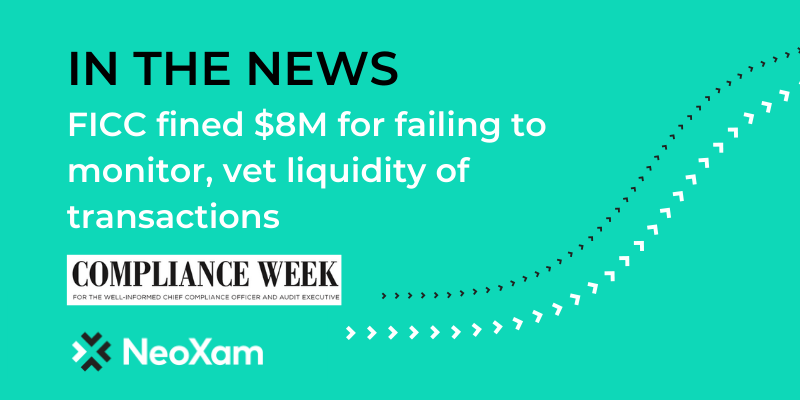
From Compliance Week:
The clearing agency for all U.S. government securities will pay an $8 million fine levied by the Securities and Exchange Commission (SEC) for failing to adequately monitor its liquidity arrangements or measure the potential failure risk by a large participant in its transactions.
The Fixed Income Clearing Corporation (FICC), a wholly owned subsidiary of The Depository Trust & Clearing Corporation (DTCC), failed to have adequate risk management policies within its Government Securities Division between April 2017 and November 2018, according to the SEC. The FICC also failed to address deficiencies in its policies and procedures on margin coverage from 2015-16, resulting in erroneous inflations that had been previously flagged by the SEC’s Division of Examinations.
In its transactions, the FICC ”substitutes itself for both sides of every transaction that it clears, guaranteeing those transactions and making itself the buyer for every seller and the seller for every buyer,” the SEC explained in a press release Friday.
“A failure by FICC to have proper risk management policies and procedures in place could adversely impact the broader U.S. financial system,” said Gurbir Grewal, director of the SEC’s Enforcement Division, in the release. “Today’s order not only ensures that FICC maintains appropriate policies and procedures, but also that it is at all times prepared to fulfill its obligations to the financial markets.”
Compliance takeaways
The FICC “failed to establish, implement, maintain, and enforce policies and procedures reasonably designed to hold sufficient qualifying liquid resources and to undertake due diligence,” the SEC stated in its order.
From April 2017 to November 2018, the FICC allegedly sought to satisfy the bulk of its prearranged funding arrangements for 16 transactions without performing adequate due diligence to determine if those arrangements “would be highly reliable in extreme but plausible market conditions.” The SEC said although the FICC conducted analyses of the repurchase market as a whole, it did not analyze the 16 individual funding arrangements to determine if there was enough liquidity available to cover the transactions.
The FICC also failed to implement and enforce policies and procedures for reviewing its risk-based margin models and parameters on at least a monthly basis, the SEC said.
As part of the order, the FICC agreed to establish a regulatory committee within six months that would review policies and procedures on liquidity resources, as well as on the due diligence performed on those liquidity resources. The committee will submit a report to the SEC within one year on its proposed action plan laying out updates and improvements to its policies and procedures.
One year after the completion of the action plan, the FICC will hire an independent compliance consultant to “review and test the FICC’s s implementation of its written policies and procedures for compliance” with the SEC rule, “and identify areas for enhancement if appropriate.” The consultant will be chosen by the FICC board but must also be acceptable to the SEC.
According to Joseph Cordahi, product strategy director for data management software vendor NeoXam, fund managers might want to start looking at end-of-day net asset valuation calculations offered up by their fund administrators.
“Ultimately, it is the portfolio manager that is responsible for agreeing or disagreeing with the calculation provided by a fund administrator,” he said. “The trouble is that the more complex the bond instrument, the harder it is to gauge whether or not the fund administrator’s calculation is accurate.”
DTCC/FICC response
The DTCC, parent company for the FICC, issued an emailed statement regarding the SEC’s fine and order.
“DTCC takes its responsibilities to protect the safety and soundness of the marketplace and to provide services that respond to clients’ needs very seriously,” the company said. “FICC has addressed the issues identified in the SEC’s order. We remain committed to delivering these services in accordance with all relevant rules and regulations and to continue interacting cooperatively and transparently with our regulators.”


